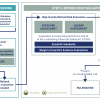The days of rivers catching on fire from high levels of pollution are long gone. These days Americans almost take it for granted that the rivers, streams and lakes around us are safe and clean. Nevertheless, there are still concerns about the potential for health risks to people and the environment from trace levels of […]

Helping EPA ensure its chemical review ‘pipeline’ under Lautenberg Act delivers as Congress intended
The Lautenberg Chemical Safety Act (LCSA) is described as having three “framework rules” – Inventory Reset, Prioritization, and Risk Evaluation. All three are designed to work together to set the stage for, and then deliver, efficient and streamlined risk evaluations of chemicals under the federal program. EPA has described this ongoing process of prioritization and […]
Working together to improve EPA’s proposed rules for chemical prioritization and risk evaluation under the Lautenberg Act
As efforts continue in earnest to implement the Frank R. Lautenberg Chemical Safety for the 21st Century Act (LCSA), ACC sees two areas in particular where industry and the Environmental Protection Agency (EPA) can work together closely to put the program on a solid footing – prioritizing chemicals for review and conducting efficient risk evaluations. […]
Carcinogen or not a carcinogen? A tale of two WHO Agencies, and the importance of evaluating study quality and human relevance
How is it possible that two World Health Organization (WHO) agencies could evaluate the same chemical’s potential to cause cancer and come to seemingly opposite conclusions? Dr. David Eastmond explored this question in a presentation at the Summer Toxicology Forum meeting comparing the approaches taken by the International Agency for Research on Cancer (IARC) and […]

Fixing EPA’s chemical assessment program – Latest reviews show IRIS is still a work in progress
It’s hard to believe but this year marks the fifth anniversary of the National Academy of Sciences’ (NAS) 2011 report on the Environmental Protection Agency’s (EPA) Integrated Risk Information System (IRIS) program. The report identified systemic problems and offered sweeping recommendations to overhaul the program. So what has happened in the five years since the […]
Tying up loose ends: How transparency and reproducibility can help improve chemical assessments
Two basic scientific principles, transparency and reproducibility, which reportedly “saved the universe as we know it,” could also help bring the scientific method back to chemical risk assessment. This post will attempt to explain why these principles are critical and how the scientific community could help make that happen. Back in 2011, scientists appeared to […]
ACC senior director of science and research addresses questions raised by the Halifax Project
For centuries, the scientific method has made possible tremendous advances in science. It’s played an instrumental role in giving us just about everything we know today about how chemicals interact with the human body and the environment. One toxicological principle to emerge from the scientific method centuries ago, and which continues to stand the test […]
IRIS progress report details key improvements, but the bar must be raised higher
According to a May 2015 progress report to Congress, the Environmental Protection Agency’s (EPA) Integrated Risk Information System (IRIS) is better off than it was a year ago, but not as effective as it needs to be to deliver timely, high-quality and credible chemical risk assessments. EPA does deserve credit, first and foremost, for following […]
What you may have missed at SOT: How ‘show and tell’ can lead to a greater understanding of chemical assessment results
Scientists are exploring new visual approaches to improve how chemical hazard values (and their inherent uncertainties) are determined and communicated to risk managers and the public so that we can all make more informed decisions about the safety of chemicals. At the Society of Toxicology (SOT) Annual Meeting in San Diego last month, Drs. Nancy […]

GlobalChem and the road ahead: Why this year’s conference marks the halfway point for one of the most transformative decades for the industry and regulations
ACC Vice President of Regulatory and Technical Affairs Mike Walls kicked off Tuesday’s GlobalChem regulatory conference with a prediction: “Ten years from now,” Walls said, “We will look back at 2015 as the inflection point in one of the most transformative decades for shaping chemical policy.” If you think about it, it’s easy to see […]
- On the road with #ACCaugust - 2015
- Chemicals in food: Top chemical food myths debunked…naturally! [video]
- Nanotechnology could be the next big thing in medical care
- Fueling Export Growth (Part 2 of 2): Why the expected surge in U.S. chemicals exports will depend on our country’s ability to deliver on its ambitious trade agenda
- Fueling Export Growth (Part 1 of 2): U.S. chemical exports linked to natural gas could double by 2030; plastics products leading the surge
- Product stewardship helps keep workers ‘Safe + Sound’ June 14, 2017
-
 Marine litter: Let’s stay focused on solutions
June 13, 2017
Marine litter: Let’s stay focused on solutions
June 13, 2017
-
 Neocon: Spotlight on high performing materials in interior design
June 12, 2017
Neocon: Spotlight on high performing materials in interior design
June 12, 2017




